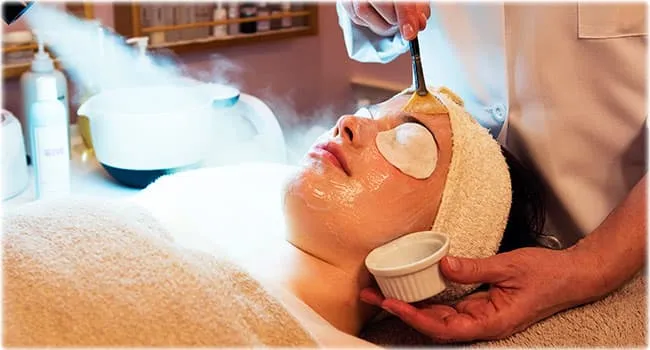Chemical Peels: How Much Do You Know?

Chemical peels usually work best on people who have:
Fair skin and light hair
Olive-to-brown skin and dark hair
Your skin type doesn't matter
Chemical peels usually work best on people who have:
If you have a darker complexion, a peel could leave you with long-lasting discoloration. Some experienced dermatologists get around this by doing lighter peels over many sessions, or they offer other treatments.

Everyone can benefit from chemical peels.
True
False
Everyone can benefit from chemical peels.
These procedures aren't a good idea if you:
Have an infection
Are pregnant or nursing
Have recently used the acne treatments isotretinoin or tretinoin
Have an active skin disease
Have cut or broken skin
Are sunburned
Have active Herpes simplex 1 sores

What's the difference between superficial, medium-depth, and deep peels?
Different chemicals and varying strengths are used
More of the same chemicals are used in a deep peel
They're different terms for same thing
What's the difference between superficial, medium-depth, and deep peels?
Each kind removes the top layers of your skin to different depths, which lets smooth skin grow back.
Superficial peels use mild acids that remove dull, dead skin cells to brighten the skin.
Medium peels involve slightly stronger acids that go deeper.They're better at targeting age spots, fine lines, and wrinkles.
Deep peels use even stronger acids to make more dramatic improvements in the skin's appearance. These work best on fair-skinned people with moderate lines or shallow scars. They also carry more risk for side effects, including changes in skin color and even scarring.

Superficial peels work best for:
Acne
Deep-set wrinkles
Rough or blotchy skin
Superficial peels work best for:
In need of a little refresher? This treatment -- often called a "lunchtime peel" -- is an easy way to get brighter and smoother skin. A doctor or aesthetician will apply a mild acid to your face, neck, chest, or hands. You can wear makeup again the same day, just make sure you avoid the sun and have broad spectrum sunscreen on. It may take 1 day to 3 days to fully recover.

How long does it take to recover from a chemical peel?
1 to 3 days
1 to 2 weeks
It depends
How long does it take to recover from a chemical peel?
No matter which type of peel you get, be patient. If you have a superficial peel, you’ll likely see some redness and irritation for up to a week.If you get medium-depth treatment, it may be 2-3 weeks before you look your best. Deep peels may take 3 weeks or longer to recover.

How long have chemical peels been around?
About 60 years
About 100 years
Thousands of years
How long have chemical peels been around?
Believe it or not, Egyptians used acids to peel the skin as early as 1550 B.C. Dermatologists have been doing these for more than half a century, so you can be sure they're relatively safe – as long as you choose a licensed professional. It's especially important to find a specialist for anything stronger than a mild superficial peel.

Chemical peels can be painful.
True
False
Chemical peels can be painful.
Beauty can have a price, and in this case, part of it is pain. How much it hurts depends on many things, including what area of your skin is being peeled, how sensitive your skin is, and what method you chose.
You'll likely feel some stinging during a mild peel, sometimes until your skin finishes healing. Deeper peels are usually more painful -- and may hurt longer -- but generally only for a few minutes while the peel is going through the top layers of your skin.
Your doctor will probably prescribe ice, steroid creams, or certain lotions to help protect your skin and ease the irritation while you're healing. You’ll also need plenty of sunscreen to avoid changes in your skin color.

A chemical peel may cause:
Oiliness
Crusting
Blackheads
A chemical peel may cause:
The most common side effects of superficial and medium peels include redness, irritation, and yes, maybe some crusting.
Although most side effects are temporary, there's a slight chance that you could end up with scarring or a permanent change in your skin color. Talk with an experienced professional practitioner about your skin type before you decide to get a peel.
Deep peels can be riskier. There's a chance they could put your heart, lungs, and kidneys at risk, so think carefully before going for it (and be especially choosy about who performs it).
Peels aren't for you if you're prone to brown spots or discoloration.